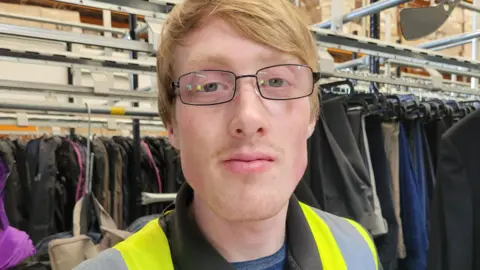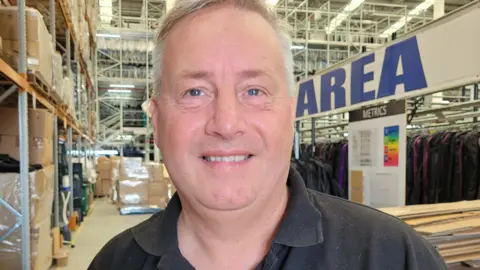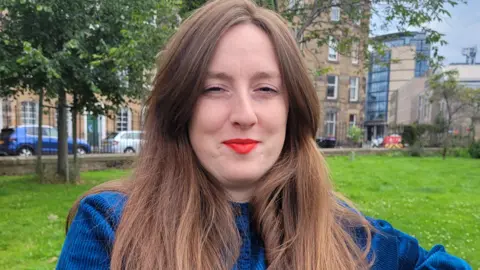 BBC
BBCScotland’s disability employment gap has been stubbornly high for years.
But there are signs that more employers are making an effort to recruit disabled people.
One company told BBC Scotland News that there is a “talent reservoir” other businesses could benefit from if they look differently at recruitment.
Michael Warren has a learning disability and has always found job interviews difficult.
He said: “I don’t remember what to say.
“I can’t read properly and I can write a little but not much.”
But he added that does not mean he is not a good employee.
The company he works for, ACS Clothing, has recently revamped its employment strategy, resulting in a workforce that is made up of 15% disabled people.
It is trying to tailor jobs to people, rather than shoehorning workers with learning disabilities into roles they might find complicated.
Mr Warren admitted: “I’m more excited to go to work.
“I’m on time more, I’ve got more friends that understand me.”

Michael Cusack, is head of sustainability for the company, which sorts and distributes clothes for hire across the UK.
Before Brexit the firm hired a lot of people from Eastern Europe.
But that has become more difficult in recent years and, as a result, the company has actively become more “tolerant and balanced” with its new hiring approach.
Mr Cusack added: “We were struggling, as are a lot of businesses.
“We’re creating a talent reservoir of people we can bring into the business to help our business grow.”
He said the company had ambitions to develop its hiring processes to include more people with physical disabilities.
“We are open to expanding,” Mr Cusack added.
“You’re tapping into a talent pool that’s got huge potential.”

Rachael Hill, an Edinburgh-based jobs coach, urged more companies to adapt their approach.
After experiencing ADHD symptoms, she said a previous manager took the time to understand how to improve her working environment.
She said that without the support of senior leaders she would not have had the self-confidence to run her own business.
Ms Hill explained: “It’s definitely about working with the individual, building that confidence, and igniting that belief in themselves.”
Complex needs
According to the Office for National Statistics, there were 777,000 economically inactive adults in Scotland last year.
About a quarter of a million were classed as disabled or long-term sick.
However, about 50,000 of those people were looking for a job.
Moving people off welfare and into employment is a challenge governments have faced for years.
The new UK government said getting disabled people into high-quality jobs is part of its plan for growth.
There is some evidence that Scotland’s disability employment gap has reduced recently, although it is still the highest in the UK.
But there are suggestions that this is because people who are already in work are reporting disabilities such as mental health issues, ADHD and autism.
Chirsty McFadyen, from the Fraser of Allander Institute, said the biggest challenge is getting people with more complex needs into work.
“That’s when the government is going to have to start really thinking about how to get disabled people who are out of work into work,” she added.
The UK government said it would devolve “more power to local areas so disabled people can benefit from joined-up work, health and skills support”.
A spokesperson added it will also enshrine in law “the full right to equal pay for disabled people to help close disability pay gaps”.

